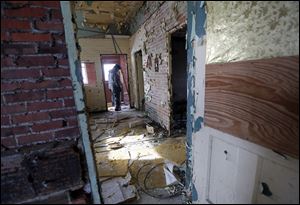
ALLEGED MISMANAGEMENT
Audit leaves homeless board out of equation
Other department to oversee federal money
6/16/2014
John Whitlow, outreach technician, looks around the abandoned Toledo Edison Acme power plant for homeless people that need food and shelter in order to bring them to a safe place in January.
The embattled Toledo-Lucas County Homelessness Board — the agency charged with overseeing homeless shelters and homelessness prevention — was criticized in a recent state audit for violations that included mismanaging money and sloppy record keeping.
As a result of the 2013 audit findings by the Ohio Development Services Agency, Tom Bonnington, the homelessness board’s executive director, and Chairman Craig Gebers agreed last month to stop directly contracting with federally funded homeless shelters and instead let the city of Toledo’s neighborhoods department oversee the federal money starting July 1.
“The board” worked out a plan with the city of Toledo on how the future contracts will be operated,” read a May 29 letter signed by Mr. Bonnington and Mr. Gebers to the state agency. “This plan will place the majority of the large expenditures on the city’s back, leaving [the homelessness board] a smaller amount to forecast for more accurate draws.”
Previously, the city received the federal money, the homelessness board acted as a subrecipient, and shelters were sub-subrecipients. The new arrangement — which was used in the past — cuts the homelessness board out as the middle man, Mr. Bonnington said.
The audit, completed Dec. 31 and obtained Friday by The Blade, cited the agency for spending money beyond allowable limits, missing documentation, and submitting a late 2010 internal audit. In all, the state agency listed $99,368 in “questioned costs.”
“The grantee’s system of internal controls is not adequate to reduce the risk of fraud, waste, and abuse to an acceptable level,” the audit reported.
It also read: “The grantee misused $98,598 of … grant funds. The monies were used to pay the expenses of another program.”
The homelessness board also withheld money meant for vendors well beyond a 15-day limit to which it is supposed to adhere.
“One check to a vendor was held for four months and another for eight months,” the audit said.
The state also cited the homelessness board for not spending $47,913 for a homelessness prevention and rapid re-housing program and demanded the money be returned. But the homelessness board asked permission to keep the money and explained why the money couldn’t be spent to help homeless people within the grant period.
The homelessness board said late audits and the lack of a “true fund accounting software package” kept it from spending the money.
The state agency ruled in a May 1 letter that most of the homelessness board’s responses were unacceptable. Both sides are waiting for a ruling from the U.S. Department of Housing and Urban Development regarding the $47,913 for homelessness prevention and rapid re-housing.
City Neighborhoods Director Tom Kroma said he was unaware of the audit or any changes to the contractual relationships among the city, the homelessness board, and the shelters.
He later downplayed the change in an email to The Blade.
“My fiscal folks and [homelessness board] were looking at ways to streamline the payment of monthly requests and this is the easiest way to do it,” Mr. Kroma said.
The homelessness board earlier this year missed a self-appointed deadline, but eventually repaid the city of Toledo $98,000. Officials with the board said in November that the money could not be found and they wanted forgiveness for the debt. They later said the money turned up and would be handed over to the city by Feb. 15.
Mr. Bonnington, who took over as executive director in mid 2013, blamed accounting methods for that error. He said the agency pays property owners rent to house homeless people or people in danger of becoming homeless. Reimbursements for those rents either did not come quickly enough or pending reimbursements were not accounted for, he said.
Additionally, the board faced an $18,000 budget shortfall this year that it planned to make up by requiring its four full-time employees and one part-time employee to take 17 unpaid furlough days. The board’s 2014 budgeted expenses are $320,000 but its expected revenues are $302,000.
Contact Ignazio Messina at: imessina@theblade.com or 419-724-6171 or on Twitter @IgnazioMessina.